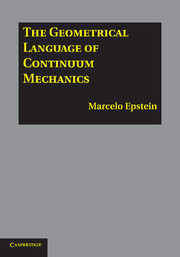2 - Vector and Affine Spaces
Published online by Cambridge University Press: 05 August 2011
Summary
Vector spaces are essentially linear structures. They are so ubiquitous in pure and applied mathematics that their review in a book such as this is fully warranted. In addition to their obvious service as the repository of quantities, such as forces and velocities, that historically gave birth to the notion of a vector, vector spaces appear in many other, sometimes unexpected, contexts. Affine spaces are often described as vector spaces without a zero, an imprecise description which, nevertheless, conveys the idea that, once an origin is chosen arbitrarily, the affine space can be regarded as a vector space. The most important example for us is the Galilean space of Classical Mechanics and, if nothing else, this example would be justification enough to devote some attention to affine spaces.
Vector Spaces: Definition and Examples
One of the most creative ideas of modern mathematics (starting from the end of the nineteenth century) has probably been to consider particularly important examples and, divesting them of as much of their particularity as permitted without loss of essence, to abstract the remaining structure and elevate it to a general category in its own right. Once created and named, the essential commonality between particular instances of this structure, within what may appear to be completely unrelated fields, comes to light and can be used to great advantage.
- Type
- Chapter
- Information
- The Geometrical Language of Continuum Mechanics , pp. 24 - 56Publisher: Cambridge University PressPrint publication year: 2010



